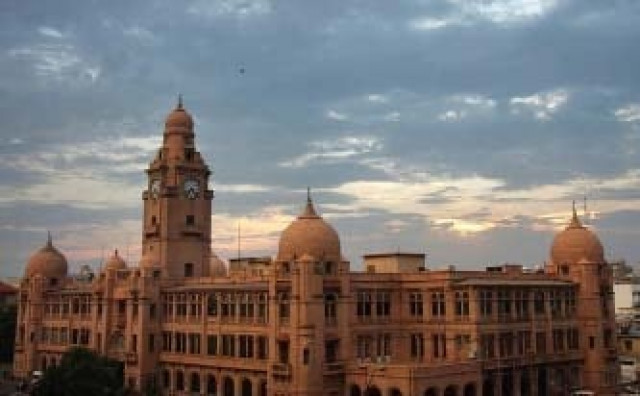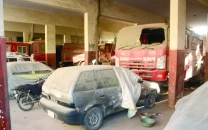Rudderless ship: After twenty-one months, KMC comes to life
Administrator Mohammad Hussain Syed opens shop, awaits funds to run Karachi.

After one and a half years, the historical KMC Building came to life once again on Wednesday as the Administrator of Karachi Metropolitan Corporation, Mohammad Hussain Syed, marked his first day at office.
The employees had taken particular care to clean up the garbage, which had piled up outside the colonial-era building since Mustafa Kamal stepped down as nazim in February 2010.
Syed held his first meeting since taking charge last week. His room is bigger than his previous office at CDGK headquarters Civic Centre. The wooden floor and walls make it look grander. As a matter of fact, he has the whole building to himself - at least until more officers are posted here.
“Right now, we don’t have the money,” he told The Express Tribune. “Our job is to keep Karachi’s road network running. We are also responsible for maintaining public parks and sports complexes. Oh yes! Construction of bridges, flyovers and underpasses is our job too.”
He could not say how many employees KMC has inherited from the defunct City District Government Karachi. “Surely, the number is much more than 12,000,” he mused.
The KMC was done away with in 1999. It has reappeared along with five district municipal corporations with the revival of the 1979 local government system (see timeline).
However, in order to run Karachi, it needs funding, which is supposed to come from the Sindh government. KMC is waiting to receive about Rs20 billion. The funds for the CDGK were frozen but the transfer has yet to take place.
Confusion
Meanwhile, in one of Malir’s grimy neighbourhoods, people started dumping their garbage on an empty plot. When the stink became unbearable, resident Rehan Ayub decided to do something.
“We didn’t know who will clean this up,” he said. “There used to be a union councilor in our area and people took their problems to him. Now the UC office directs us to the town administration. I think no one wants to go that far.”
The garbage was removed but only after some people pulled a few strings that were tied to the top - the Karachi Administrator’s office. But not everyone, in Karachi’s city of 20 million people can throw their weight around like this. And thus, simple problems and their solutions such as sending around a garbage truck are likely to persist as long as there is confusion on who is in charge.
The confusion has been created by the flip-flopping between the local government systems of 1979 and 2001. The back and forth between these ordinances has emerged as a casualty of relations between the two parties that effectively make decisions for Karachi and the rest of Sindh’s cities - the Pakistan Peoples Party (PPP) and its coalition partner, the Muttahida Qaumi Movement (MQM). The bureaucratic mess has been further complicated by introduction of the PPP-favoured commissionerate system that is unrelated to local government legally but in the minds of the public has come to signify an alternate to the 2001 LG system the MQM favours. At present, Karachi’s administrative structure of 18 towns has been dissolved. The job of picking up the garbage from outside your house, cleaning the roads and sewerage pipes has been assigned to the five district municipal corporations (DMCs), each of which is headed by a senior bureaucrat. Their chief is the Commissioner, Roshan Ali Shaikh.
“Do you think a government official cares about cleaning up the dead dog lying in front of my door?” said a disgruntled resident of Saddar. “No. He has no interest here. He does not need my vote.”
Former city nazims Mustafa Kamal and Niamatullah Khan have both voiced support in favour of public representation rather than bureaucrats in the city administration. They believe that bureaucrats tend to follow orders from the ‘top’ rather than looking ‘down’ to the people who need their services. Ex-councilor Muhammad Nasir explained that the fear of falling out of favour with the residents forced him and others like him to be available in their constituency around the clock. “I had the power to call the water and sewerage office and ask the people there to restore the supply or replace a choked drainage pipe,” he said. “I don’t think anyone will go and wait outside the deputy commissioner’s office just because a cover is missing from the manhole outside his house.” Last week, before Syed went to KMC building people were flowing into his office. “Please sir! Do something about my husband’s pension,” cried an elderly woman to Syed who scurried from the anteroom to his office.
One by one, he addressed a dozen people, writing notes on small paper slips and signing them. “Go home now. Your work will be done,” he kept saying as he handed them out. But by the evening, there were ten more people still waiting outside his office. They were asked to come the next day.
A senior official smiled when asked to explain the bureaucratic changes and who is actually in charge of running Karachi. “This is all hogwash,” he said. “In [a few] days, we would have a new ordinance, which will create a local government system like the last one.” These developments are likely to take place on Friday when the Sindh Assembly is scheduled to meet.
Published in The Express Tribune, November 17th, 2011.



















COMMENTS
Comments are moderated and generally will be posted if they are on-topic and not abusive.
For more information, please see our Comments FAQ